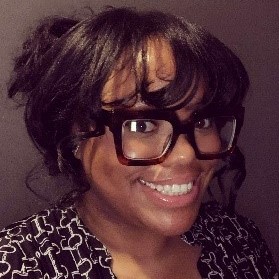Blogs

EdD student shares how her battle with leukemia inspires her research on culturally responsive support groups.
By Jewell Lay
I was diagnosed with Acute Myeloid Leukemia on December 14, 1999. As an 11-year-old, I really did not have a clear understanding of what was going on. Still, I knew then that whatever was happening was huge, devastating, and extremely scary. I remember watching my mother struggle, trying to keep it together. As an only child, I was her world, so seeing me so close to death's door was devastating in ways I still cannot fully comprehend.
Even then, I remember things that seemed strange, such as my nurse’s insistence to wash my hair and commenting about how dirty it seemed. I remember her wetting it and then refusing to comb it. I remember my mother finding someone to braid it as I lay there. The tension from the braids prematurely removed all my hair within a week of my starting chemo. I remember how cold I felt. I remember my mother sleeping with me every night in the hospital for months—my constant watch tower.
Many things, however, passed unnoticed. I do not remember the microaggressions she constantly faced while I underwent treatment. The snide remarks about Medicaid (which we were not on) and the constant commentary about how “mean” and “angry” she was as if her only child wasn’t dying in front of her eyes. The insinuations about us were made continuously and callously by those tasked with healing me. This I did not learn until many years later.
The impact of these childhood experiences has traveled with me well into adulthood and ultimately inspired my work in this program. What I saw, felt, and learned is not exceptional. These experiences are unfortunately common for Black women seeking health care. The commonality of these shared experiences ultimately inspired my research. I chose social support network formation amongst Black women cancer patients and survivors as my Dissertation in Practice topic.
According to the American Cancer Society, African Americans have the highest death rate amongst any racial or ethnic minority for most cancers. This disparity in survivorship can be attributed to many things, such as lower rates of health insurance, less access to advanced facilities, higher rates of chronic illness or comorbidity, and discrimination.
Unfortunately, discrimination in healthcare has a long legacy stretching all the way back into the antebellum south. Stories in which physicians would purchase slaves from the auction block to experiment on are sadly common. For women in particular, forced slave breeding, forced sterilization, or reproductive experimentation was not infrequent. Though we have progressed past the barbarism once common, the modern age has many instances of inequity, as the ghosts of Henrietta Lacks or the Tuskegee Syphilis Study haunt us still.
Considering this, I reiterate, my experiences were not exceptional, devastating, and emotional though they may be. What is exceptional, however, is the incredible work several small non-profits are doing to disrupt these disparities. One such organization, Cancer SSN (a pseudonym), worked with me to develop an intervention to improve the mental well-being and social support available to Black women cancer patients and survivors within their organization.
Among many types of support, social support is one positive influence in the fight against critical illness. Social support, however, is intensely personal. My research took an intersectional ecological systems approach in exploring how social support may manifest in a culturally responsive intervention. An ecological systems approach views how we are interconnected throughout all societal levels, from the micro, such as our parents, to the macro, such as the government. Intersectionality, however, my experience as a Black woman directly impacts how I perceive myself and society and, more importantly, how society perceives me. Though we are all connected, our social location determines how we navigate those connections, what we can offer, and what we may need.
Therefore, to promote a culturally responsive intervention, it is essential to conceptualize what makes us who we are, how we are present in society, and how society perceives us. This concept is big, so to better understand what the women in Cancer SSN may need, I used a critical ethnography to gather more of their life histories.
Being a participant observer and one who has shared the same experiences as so many within the organization allowed me to dive deep to understand the unique experiences of Black women cancer patients and survivors. What does this demographic need, and how can Cancer SSN facilitate those needs in a culturally responsive way?
Black people are not a monolith. The stories I collected were varied and nuanced, covering many positive and negative experiences. However, there were several unifying themes, chiefly the importance of community and kinship, with people who understand your struggle, have experienced your pain, and can offer practical advice and education as you move forward.
I reflect on the days I was going through treatment and how different my life may have been had such a group existed for my mother and me then. I wonder what would have happened had we not been so isolated in our experiences, even from each other. She will never know what it's like to fight cancer, and I will never know what it's like to watch your child almost die, but someone out there understands.
Through this study, I hope to spread awareness about the necessity of culturally responsive support groups. The struggle of fighting any critical illness is difficult enough. We do not have to struggle alone. By sharing a bit about myself and the work of many outstanding organizations, our future looks brighter than our past, and more people discover the incredible organizations doing this work every day.
Cancer sucks, but surrounding yourself with supportive people improves it.
